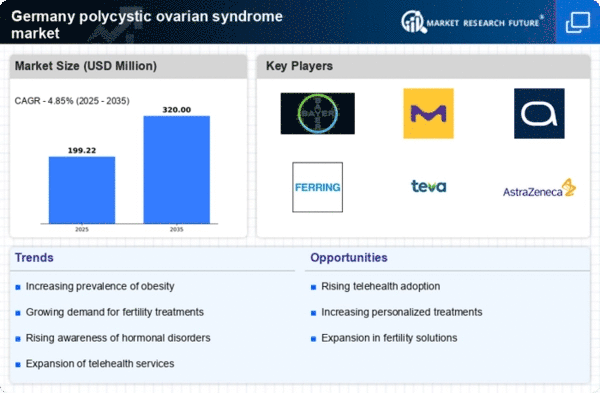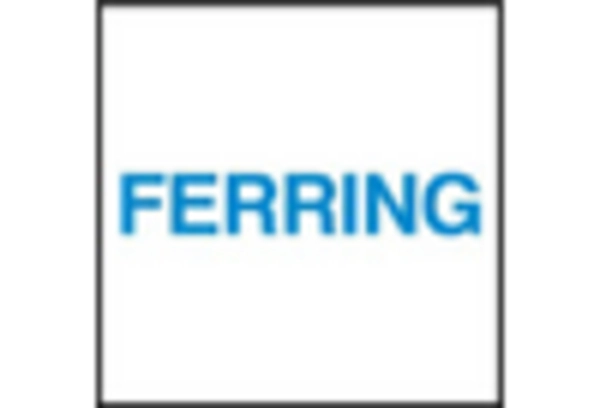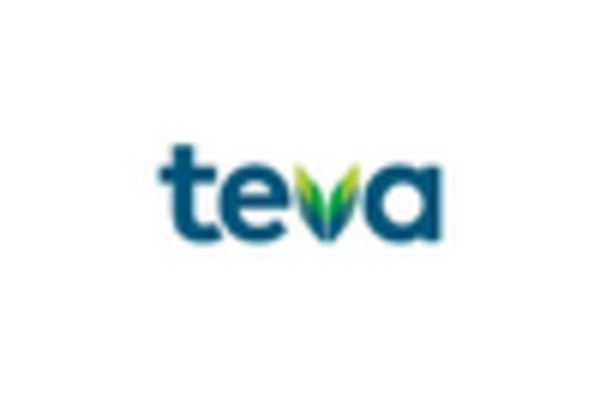Increasing Incidence of PCOS
The rising incidence of polycystic ovarian syndrome (PCOS) in Germany is a crucial driver for the polycystic ovarian-syndrome market. Recent studies indicate that approximately 5-10% of women of reproductive age are affected by this condition, leading to a growing demand for effective treatment options. The increasing prevalence of obesity and sedentary lifestyles among the population further exacerbates the situation, as these factors are closely linked to the development of PCOS. Consequently, healthcare providers are focusing on early diagnosis and management strategies, which is likely to boost the market for medications and therapies aimed at treating this syndrome. As awareness of PCOS continues to grow, the polycystic ovarian-syndrome market is expected to expand significantly in response to the increasing need for specialized healthcare services.
Government Initiatives and Support
Government initiatives aimed at improving women's health in Germany play a pivotal role in driving the polycystic ovarian-syndrome market. Various health programs and policies are being implemented to raise awareness about PCOS and its implications. For instance, funding for research and development of new treatment modalities is being prioritized, which could lead to innovative solutions for managing the condition. Additionally, public health campaigns are designed to educate women about the symptoms and risks associated with PCOS, encouraging them to seek medical advice. This proactive approach by the government is likely to enhance the accessibility of healthcare services, thereby fostering growth in the polycystic ovarian-syndrome market as more women are diagnosed and treated effectively.
Advancements in Diagnostic Techniques
The evolution of diagnostic techniques for polycystic ovarian syndrome is significantly influencing the polycystic ovarian-syndrome market. Enhanced imaging technologies and laboratory tests have improved the accuracy of PCOS diagnoses, allowing for earlier intervention and management. For example, the introduction of non-invasive diagnostic methods has made it easier for healthcare professionals to identify the condition, which is crucial for effective treatment planning. As diagnostic capabilities continue to advance, the market is likely to see an increase in the number of women being diagnosed with PCOS, subsequently driving demand for therapeutic options. This trend suggests a positive outlook for the polycystic ovarian-syndrome market as healthcare providers become more adept at recognizing and addressing this complex condition.
Rising Demand for Fertility Treatments
The increasing demand for fertility treatments among women with polycystic ovarian syndrome is a significant driver for the polycystic ovarian-syndrome market. PCOS is one of the leading causes of infertility, prompting many affected women to seek medical assistance to conceive. In Germany, the number of women pursuing assisted reproductive technologies, such as in vitro fertilization (IVF), has been on the rise. This trend is likely to continue as awareness of the link between PCOS and fertility issues grows. Consequently, healthcare providers are expanding their offerings of fertility treatments tailored to women with PCOS, which is expected to contribute to the overall growth of the polycystic ovarian-syndrome market as more women seek specialized care.
Increased Focus on Lifestyle Management
There is a growing emphasis on lifestyle management as a means to mitigate the symptoms of polycystic ovarian syndrome, which is influencing the polycystic ovarian-syndrome market. Healthcare professionals in Germany are increasingly advocating for lifestyle modifications, including dietary changes and exercise regimens, as part of a comprehensive treatment plan for PCOS. This shift towards holistic management strategies is likely to drive demand for related products and services, such as nutritional supplements and fitness programs tailored for women with PCOS. As more women recognize the importance of lifestyle changes in managing their condition, the polycystic ovarian-syndrome market may experience a notable increase in growth opportunities.
















